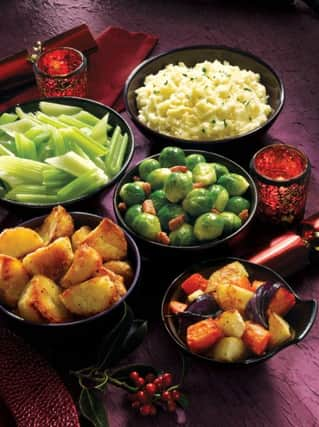Don't allow vegetables to become the poor relations this Christmas


I could happily forgo the main meats and just have stuffing and deliciously roasted roots, slow braised red cabbage and a deep dish of creamy Dauphinoise potatoes. Christmas lunch should be special, we shouldn’t treat the accompanying sides like the poor relations.
Sourcing of vegetables should be a priority. There is a definite difference in the taste of a muck caked carrot versus one that has been washed and trapped in plastic. The former will be sweet as honey and have a better texture.
Advertisement
Hide AdAdvertisement
Hide AdThere are markets and farm shops dotted throughout the country. They’ll be cheaper and have better quality produce and you’ll be supporting a local farmer rather than a major conglomerate. When you have something as good as this there’s no need to mess around with it. Toss in oil, season with sea salt, add some fresh thyme or rosemary and roast until soft and golden, giving the odd shake to stop it sticking.
When you drive out of Newtownards in early winter the sloping fields that hug Strangford Lough are like a patchwork of vegetables – verdant green leeks and scallions and purple-hued cabbages.
They’re growing on Roy and Sheila Lyttle’s farm and it’s one of the prettiest sights in the country. When I see asparagus on winter menus, imported from Peru, it’s hard to understand why some chefs ignore the wonderful produce on their doorstep in favour of blingy stuff from the other side of the world.
I like to split the Lyttle’s leeks in half lengthwise with the root intact, give them a good wash and then poach gently in water with a vegetable stock cube added and some garlic and fresh rosemary. When they’re just done, pat them dry and then brush with oil. Cook on a smoking hot grill pan to mark and then drizzle with in a simple vinaigrette of two tablespoons of vinegar, whisked with a teaspoon of mustard and 50ml Broighter Gold rapeseed oil. Add in some fresh chopped curly parsley and season.
Advertisement
Hide AdAdvertisement
Hide AdWe’ve forgotten our own curly parsley in favour of the flat Italian variety and while there’s nothing wrong with the Latin version, the fresh citrusy zing of our home grown leaf is hard to beat.
Horner’s Farm shop on the Coach Road in Comber are stocked with all the best local vegetables from Co Down. The cabbage you’ll get there won’t look like a purple Uncle Fester head from the Adam’s Family that you’ll pick up in a supermarket, but instead it billows with large leaves and has a bluey hue.
My first recipe this week is for spiced red cabbage, braised with vinegar, spices and red wine. Its colour alone will brighten up any Christmas lunch, never mind the intoxicating smell of aromatics.
Whether you do your roasties in dripping, oil or goosefat, the most important thing is the potato. I’ve been using William Hunter’s Aghadowey Maris Pipers to great effect. Power boil them, drain and dry well, sprinkle in a little flour and then add to hot fat of your choice. (My preferred is Broighter Gold rapeseed oil as the spuds are crispy and golden but you don’t get that heavy after feeling you get from animal fat) and cook until crisp.
Advertisement
Hide AdAdvertisement
Hide AdYou can buy these magnificent tubers in Osborne’s Butchers in Portstewart and pick up some of their great bacon while you’re there. Mash and roasties is the traditional treatment of the humble spud at Christmas but a Dauphinoise makes a lovely change – thin slices of potato suspended in a cream redolent of cracked pepper and nutmeg. When you set a big dish of golden topped, bubbling dauphinoise on the table it will always elicit a brilliant reaction.
My last recipe is for the stuffing we have every year in our family. It’s a variation on one from the failsafe cordon bleu cookery books. Celery, walnut and apricots are combined with breadcrumbs and sausage meat. Nutty Krust is my bread of choice for this and the butcher will set aside sausage meat for you that’s a lot less fatty than the mass produced kind.